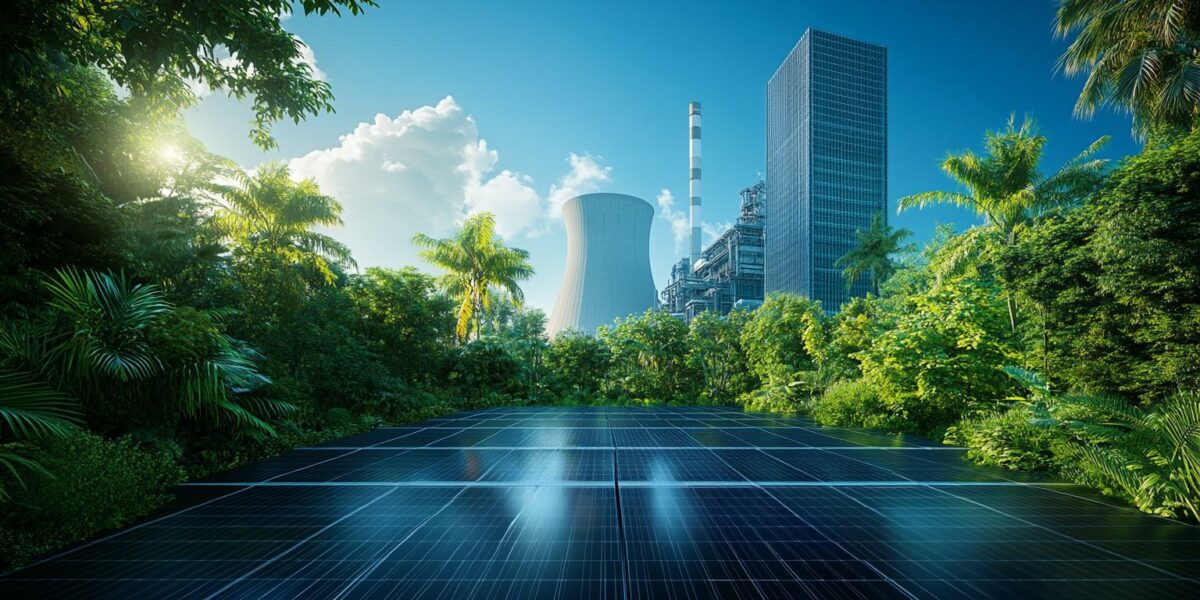The Financial Backbone of Nuclear Energy
In 2024, the conversation around climate change shifts significantly with a focus on nuclear energy financing. Innovative financial models are essential to unlocking nuclear potential as part of a low-carbon future. This shift demands the involvement of financiers, policymakers, and environmental stakeholders.
Robust financial frameworks are crucial for propelling nuclear energy to the forefront of climate solutions. These frameworks must ensure that nuclear projects are viable and sustainable. As global decarbonization efforts intensify, financing becomes a critical piece of the puzzle.
The publication addresses the complex landscape of financing nuclear projects, highlighting both challenges and best practices. It serves as a guide for climate negotiators and financial experts, focusing on the symbiotic relationship between sustainability and finance.
Key players in the energy sector must navigate through intricate financial mechanisms to successfully implement nuclear energy projects. The 2024 report emphasizes the importance of collaboration between governments and investors to achieve ambitious climate goals.
Advantages of Nuclear Power in Climate Mitigation
Nuclear energy stands as a cornerstone in achieving global climate targets. Its capacity for clean energy production surpasses many other sources, making it indispensable in climate strategies. The technology’s potential in reducing carbon footprints is immense.
Three major advantages of nuclear power include:
- High energy output with minimal emissions
- Long-term reliability and stability
- Scalability to meet growing energy demands
These benefits position nuclear energy as a key player in the sustainable energy transition.
Despite its advantages, nuclear energy faces numerous challenges, particularly in terms of public perception and safety concerns. Addressing these issues is paramount for its broader acceptance as a climate solution.
International cooperation and innovative policy frameworks can help overcome these challenges. By fostering a positive outlook, nuclear energy can contribute significantly to climate mitigation efforts worldwide.
Integrating Nuclear Energy into Global Policies
As the world grapples with climate change, integrating nuclear energy into global policies becomes imperative. Policymakers are urged to consider nuclear power as a viable option in their climate strategies. Its inclusion can expedite the transition to a low-carbon economy.
Effective integration requires a comprehensive approach, blending nuclear energy with other renewable technologies. This hybrid model can optimize resource use and enhance energy security, offering a robust solution to climate challenges.
Policy frameworks must evolve to support nuclear energy, addressing regulatory hurdles and fostering an environment conducive to investment. This evolution is crucial for achieving the United Nations’ sustainable development goals.
Ultimately, nuclear energy’s role in climate change mitigation depends heavily on policy support. By recognizing its potential, governments can drive significant progress towards a sustainable future.
Overcoming Financial and Policy Barriers
Financing and policy barriers remain significant obstacles to the widespread adoption of nuclear energy. To address these challenges, a multi-faceted approach is necessary, involving collaboration between all stakeholders in the energy sector.
Innovative financing solutions, such as public-private partnerships and green bonds, can unlock new funding opportunities for nuclear projects. These financial tools are essential for overcoming investment barriers and enabling large-scale implementation.
Policy reforms that streamline regulatory processes can further facilitate nuclear energy projects. Simplifying licensing and approval mechanisms can significantly reduce project timelines and costs, making nuclear energy more accessible.
The path forward requires a collective effort, with a focus on transparency, communication, and trust-building among all parties involved. By addressing these barriers, nuclear energy can contribute significantly to a sustainable and resilient energy future.



connor
Great insights, but what about the public perception of nuclear energy? It’s still a bit scary for many.
nathan
Finally, a plan that involves everyone! Let’s hope policymakers are on board. 🙂
laurenradiance
Interesting read! Do you think other renewable sources are getting enough attention?
james_stardust
I’m all for green energy, but doesn’t nuclear waste remain a huge problem?
Kayla_Dreamweaver
How will these financial models impact the cost of nuclear energy for consumers?
ryan_quantum
So are we basically saying nuclear is the future? Feels like we’re going back to the past! 😂
JasperDreamer
Thank you for highlighting the need for policy support! It’s crucial for making any significant progress.
Socks_Dreamer
Can someone explain these new finance models in simpler terms? I’m lost! 🤔
SophiaSerenity
Love the idea but how do we convince investors to put money in nuclear with all the perceived risks?
HannahPrism
Wow, nuclear energy’s really making a comeback! But are we sure it’s safe enough for widespread use?